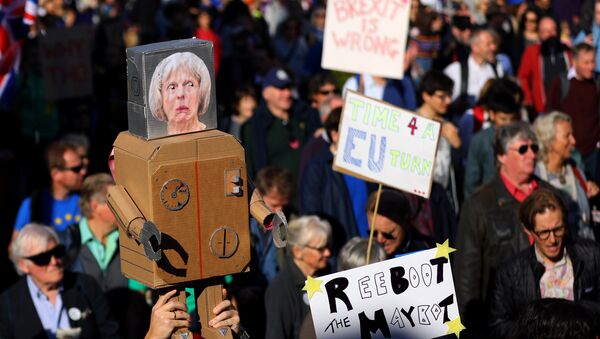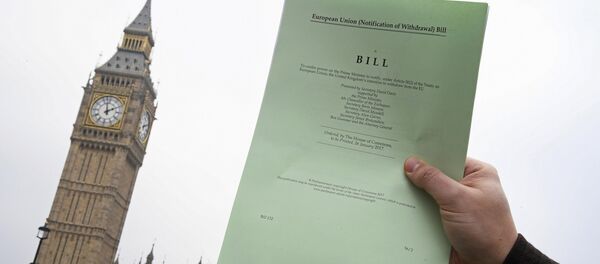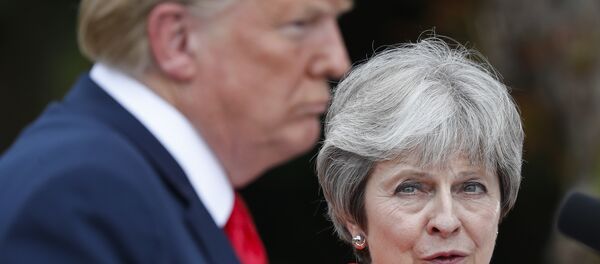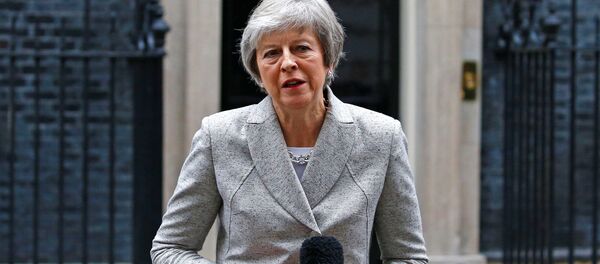May's Brexit deal has been approved by EU leaders after 1.5 years of negotiations. Mrs May has already warned MPs that their failure to accept the deal would take Britain ‘back to square one', adding that it would open the door to more division and uncertainty.
Sputnik discussed Theresa May's future with John Curtice, a professor of politics at Strathclyde University and president of the British Polling Council.
Sputnik: The Times has said that some Conservative lawmakers would support Theresa May's deal if she promises to provide a resignation date. What are your thoughts on this? How realistic is this? Why is it necessary for her to resign if her deal is approved?
The truth is that those who are keenest on Brexit inside the Conservative Party are much keener on the Canada option than they are on the ‘very close to the EU' option. One suspects that some of them feel that given her form so far in the negotiations, if Theresa May continues to be in charge of the negotiation, she may go for a much softer, closer relationship with the European Union in the negotiations about our future relationship that will take place in the next two years if the deal goes through.
Therefore, perhaps, they might be more willing to vote for the deal as it is at present if they feel that the person in charge of the negotiations in the next two years is somebody of a mind much closer to their own. That's the logic of what's going on. Basically, MPs who are doubtful about the deal are not willing to trust Theresa May to continue with the negotiations during the next phase of them.
READ MORE: Tory MPs Will Back May's Brexit Deal if PM Sets Resignation Date — Reports
Sputnik: Do you think that this is just about that Theresa May was initially a Remain campaigner?
John Curtice: That's, undoubtedly, part of the perspective of those who are keenest on leaving. They look at the way in which the government is selling the deal, and the government is selling the deal on the ground that it might, indeed, still be something that would look like the so-called Chequers agreement that the prime minister published back in July and persuaded her Cabinet to back.
I think that's, at least for them, an example of how the vision that the prime minister has of the UK's future relations with the European Union is just envisaging too close and too soft of a relationship than they had hoped to achieve as a result of Brexit.
READ MORE: #Brexit: 'We Have a More Concrete Scenario Than We Had Before' — Scholar
Sputnik: Reuters has reported that it's been said that the future relationship is not binding and that means that Theresa May herself is the problem, not the deal per se, since it leaves flexibility for her successor to organize something that would appease some of the Conservatives, as far as the Irish border and a move toward Canada. Do you think that there's somebody who can actually accomplish that? Because the EU has said that this is the only deal and the best deal that they could possibly give the UK.
John Curtice: The truth is that the issue that is causing most difficulty inside the Conservative Party, so far as the Brexit deal is concerned, is the issue of the so-called Northern Irish backstop.
The idea that if by 2020, the UK and the European Union haven't sorted out the future relationship that, in the view of the EU, would mean that there would not need to be a hard border between the north and the south of Ireland. In most circumstances, the UK would remain within the customs union for a longer period of time in order to avoid that border.
They just feel that's too close of a compromise on the UK's sovereignty. That is the crucial issue, but that is in black in white. Whether or not the prime minister could get anything more out of the European Union if the deal is rejected, we don't know; but in truth, there probably is nothing that will be better ensured to enable her to get the deal through a second time would be movement by the European Union on that issue.
Meanwhile, as far as the future relationship is concerned, this's no more than a fiscal agreement, and it still leaves open a very wide range of options; it's a list of aspirations, except that one thing that's very clear from the document is that the closeness of the relationship the UK will have with the European Union will depend very much on how much the UK is willing to continue to follow the rules and regulations of the European Union's single market.
And that, in a sense, is a debate that undoubtedly would continue down the track and on which the Conservative MPs, frankly, have very different views.
READ MORE: Brexit Might Result in More Beneficial Russian-UK Relations — Russian Embassy
Sputnik: It seems that she has just done so much; the task that she's had in negotiating any deal over these past months has been very difficult. Some would say that this is similar to Sisyphus having to push the rock up the hill only to have your liver torn out. Do you think that she would actually go on and resign after having done that?
John Curtice: One has to say that the prime minister so far shows little sign of willingness to resign. At the moment I think that she is caught in a position where it has been a very difficult process negotiating the deal with the European Union, not only because it's been difficult vis-à-vis trying to avoid some things that the EU was proposing that she particularly disliked, but also continuing to keep her Cabinet together.
The trouble is that the rope for engaging in that strategy has now run out; it's now clear where the end stage is as far as the possible withdrawal treaty is concerned, and it's become much more difficult to keep things together. She seems to be in a place at the moment where, basically, she is going to fight for this deal. She is going to try and get it through the House of Commons in December.
The truth is that at the moment it's very difficult to see how she is going to get it through. Given the extent to which she has invested her own personal authority on this deal, certainly if the deal goes down badly, it's very difficult to see how she can remain as prime minister for much longer.
Views and opinions expressed in the article are those of John Curtice and dod not necessarily reflect those of Sputnik.





